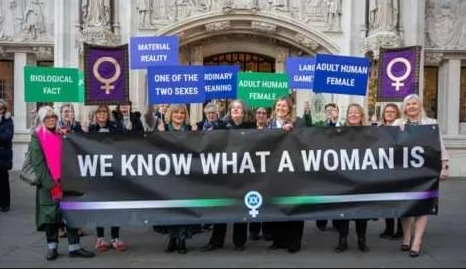
The case is the culmination of a challenge brought against the Scottish government by a women’s group.
But the ruling could have a major bearing how sex-based rights are applied through the Equality Act across Scotland, England and Wales.
{snip}
A ruling is due to be handed down at the court in London on 16 April.
It is expected to set out exactly how the law should treat trans people, and could have implications for the running of single-sex spaces and services.
The long-running legal dispute began with a bill passed at Holyrood in 2018 which aimed to ensure gender balance on public sector boards.
{snip}
And it is no longer limited to Scottish law – the judges are deciding on the proper interpretation of the 2010 Equality Act, which applies across Great Britain.
The Act provides protection against discrimination on the basis of various characteristics, including “sex” and “gender reassignment”.
The question before the court is what that law means by “sex”.
Aidan O’Neill KC, representing For Women Scotland, told the court in November that the “common sense” meaning of the words man and would should be reflected, saying that sex is “an immutable biological state”.
{snip}
Its lawyer, Ruth Crawford KC, told judge that “a person who has become the sex of their acquired gender is entitled to the protections of that sex”.
Five judges heard two days of argument in November, and they will reconvene to hand down the judgement next Wednesday.
The court’s president, Lord Reed, will read a summary of what they have decided at around 09:45.
{snip}
For Women Scotland argue that this could have implications for the running of single-sex spaces and services, from hospital wards and prisons to refuges and support groups.
The court heard that it could also affect equal pay claims, maternity policy and sports events, as well as single-sex associations like gay and lesbian clubs.
However trans people have voiced concerns that the case could erode the protections they have against discrimination in their reassigned gender.
{snip}
The case could also lead to calls for changes to the law itself.
The Equality and Human Rights Commission – the national equalities regulator which is tasked with enforcing the 2010 Act – made an intervention in the case to call for legal reforms.
It said MPs had intended to include those with a gender recognition certificate as having changed their sex when they passed the Equality Act in 2010, but said they may not have appreciated consequences which “jeopardise the rights and interests of women and same-sex attracted people”.
{snip}
Meanwhile the Scottish parliament passed a sweeping gender reform bill in 2022, which would have introduced a simplified system of “self-identification” – but the move was blocked by the UK government, and has since been dropped.
* Original Article:
https://www.bbc.com/news/articles/c5ygg48k7nmo.amp?xtor=AL-%5B72%5D-%5Bpartner%5D-%5Bsmart.news%5D-%5Bheadline%5D-%5Bnews%5D-%5Bbizdev%5D-%5Bisapi%5D